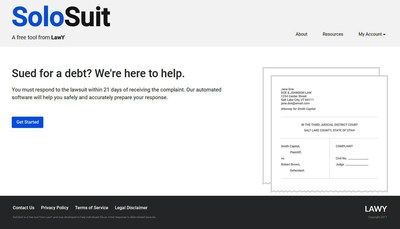TMCnet News
BYU Law Develops Free Online Tool, SoloSuit, to Address Debt Collection Epidemic in UtahPROVO, Utah, Jan. 24, 2018 /PRNewswire/ -- BYU Law School, a leading national law school focused on innovation in the legal field, today announced the development of SoloSuit – a free online tool that helps Utahns who cannot afford legal services to respond to debt collection lawsuits. SoloSuit is the first product designed by LawX, a legal design lab at BYU Law School with the ambitious goal to solve one legal challenge each fall semester.
"Early in the semester, we realized that debt collection was a legal crisis in Utah," said Kimball Dean Parker, LawX co-founder and class instructor. "In the last five years, debt collectors in Utah filed over 330,000 lawsuits; 98.5 percent of those sued do not hire an attorney. And in some years, over 80 percent of those sued did not respond, causing them to automatically lose their case. SoloSuit provides a simple platform for debtors to respond to a lawsuit in as little as 10 minutes." LawX, which debuted this past fall for second- and third-year BYU Law students, was conceived by BYU Law Dean Gordon Smith and Parker, an attorney at Parsons Behle & Latimer who teaches the LawX course. LawX is structured as a design-thinking process in which students find the best solution to social legal issues, whether it is a change in policy, process or product. LawX participants have fast-paced deadlines and responsibilities that are much like being in a startup. As part of the class, students received a crash course in design thinking and support from IBM designers, while also collaborating with students and professors in other departments at BYU, as well as alumni, local businesses, legal professionals and organizations. "The law is often unfair to people who cannot afford a lawyer, and LawX is developing solutions that help level the playing field," said Cami Schiel, a third-year BYU Law student. "It has been the experience of a lifetime to bring a solution from idea to market, and I am looking forward to seeing SoloSuit's success." SoloSuit is available for free at www.solosuit.com. Defendants are able to respond to a debt collection complaint by following a quick and simple response form with online prompts. Their finished answers are then available to download and print for submission to the courts. While going through the design process, LawX identified several rules in Utah that make it difficult for people facing debt collection lawsuits without the benefit of legal representation. "One example is that Utah requires those who can't afford an attorney to print their response and mail or hand deliver it to the court," said Parker. "Only lawyers can deliver those documents electronically. Most of the debtors we spoke with don't own printers or use the mail regularly. We estimate this rule alone prevents 15 percent to 20 percent of people from responding. It needs to change." LawX is in discussions with the Utah court system to resolve these issues. The students working in the LawX lab also quickly realized that Utah is not the only state facing debt collection problems. As they worked to design a solution, they were careful to build the software in a way that can be easily adapted to other states and even to other areas of law. "We think the software could help make the law accessible to millions of people across the nation," said second-year BYU Law student Brock Foley. "The Alaska court system will pilot the software for debt collection cases in their state later this year, and LawX is currently in discussions with Step Up to Justice, a non-profit organization in Arizona, to adopt the software to eviction cases in that state." BYU Law School is confident that there are other court systems and non-profit organizations that will be able to adapt the software to the needs in their states and areas of focus. "The work being done by LawX beautifully complements BYU Law School's mission to make the world a better place for those who lack resources and strength," said Dean Smith. "LawX is tackling some of the most challenging issues facing our legal system today with an emphasis on non-lawyers who need help navigating a system that is designed for legal professionals. It is refreshing to see the strides LawX has made in a single semester, and I look forward to seeing LawX's positive impact in Utah and beyond for years to come." SoloSuit has been transferred to LawY, an independent entity that will maintain and operate the service while LawX moves on to its next challenge. To try SoloSuit, visit www.solosuit.com. For more information about LawX, follow @LawXLab on Twitter or the LawX blog at https://lawxblog.wordpress.com/. For more information on BYU Law, visit http://www.law.byu.edu/. About BYU Law School Founded in 1971, the J. Reuben Clark Law School (BYU Law) has grown into one of the nation's leading law schools – recognized for innovative research and teaching in social change, transactional design, entrepreneurship, corpus linguistics, criminal justice and religious freedom. The Law School has more than 6,000 alumni serving in communities around the world. In its most recent rankings, SoFi ranked BYU Law as the #1 best-value US law school in their 2017 Return on Education Law School Ranking. For more information visit http://www.law.byu.edu/.
SOURCE BYU Law School 
|

